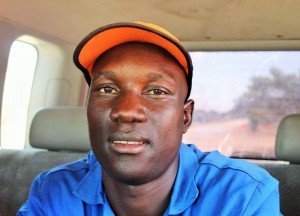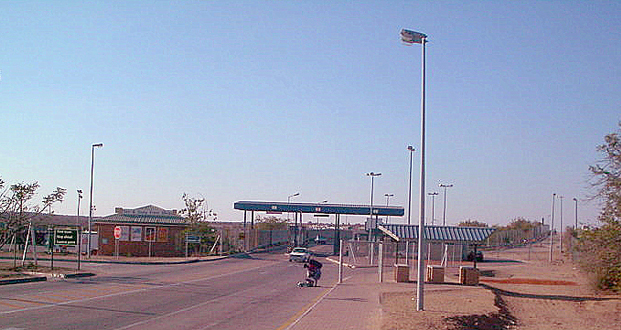On a dusty township street on the western edges of Bulawayo, Zimbabwe’s second largest city, Clever Ngwenya, 28, tries to sell his phone to a taxi driver. Hustling, Mike makes a cheap offer, but Ngwenya shakes his head. Determined to get a decent price for the almost-new smartphone, he sticks to his guns. Eventually, the streetwise driver buckles and ups his bid.

But in spite of the ordeal, some of the freshly repatriated  are prepared to risk returning to more prosperous Botswana and South Africa – even without documentation – rather than scrap out a living in struggling Zimbabwe.
Keen to go back to Francistown, Botswana’s eastern second city, where he makes a living as a carpenter, Ngwenya complains about the living conditions in Lindela.
“I’d gone to South Africa in April without a passport; I was on leave from work in Botswana and I was caught by the police in Rusty (Rustenburg). I was taken to Lindela where we were ill-treated by the guards. Lindela is not a place to go. There are many sick people in there and I got a very bad flu. I couldn’t breathe, I really felt like I would die in there,†Ngwenya told The Daily Vox.
“There were so many people from different countries, Bangladesh, Mozambique and Lesotho, but us Zimbabweans are the most. Every day we are being caught and we stay in there for a long time – some people have been there for nine months or even a year. They don’t want us in eGoli (South Africa),†Ngwenya said .
After experiencing detention in a place often accused of human-rights abuses by civil-society groups Ngwenya swears he’ll never visit South Africa again.

“I jumped the border when things got bad here in 2008 and I found work as a plaster man in Klerksdorp. I don’t have any school certificates so it’s hard to get a permit, so whenever I’d go, I used to jump,†he said.
“But after the xenophobia attacks the police came to the building site where I was working. They started asking for papers and arrested about 40 of us who didn’t have anything. We were taken to jail, then to Lindela. It was really terrible there – I can’t go back there,†Ncube said, shaking his head.
For now Ncube is trying to settle back at home, willing to try his hand at farming in Nkayi, his rural district in south-western Zimbabwe. Although he’s afraid xenophobic attacks could resurge in South Africa, Ncube is also uncertain about his future in Zimbabwe. If his agricultural project struggles, he says he may leave again via illegal means.
And he’s not the only one who might consider jumping the border again. Days after their release, the majority of deportees are reportedly still stranded in Beitbridge and without the means to travel to their home areas. Others, however, have allegedly snuck back across the border using the river or by road.
Melusi Dlamini, 38, a crossing agent who ferries undocumented people by road, claimed a number of deportees had already returned since their release on Friday.
“Some people from Lindela went back as soon as they came, I’ve taken some of them back already. It’s not hard to go – I charge R400 per person and it covers everything up to Musina, but if someone wants to go further, I charge more,†he said.
Dlamini explained that while he kept the larger share of the fare, a portion of the money was used to pay off security and immigration officials at both the South African and Zimbabwean borders.
Tales of bribery of Beitbridge-Musina border staff and returning deportees are not uncommon. Zimbabwe’s immigration and social welfare officials declined to comment on the matter. However a border official, who did not give their name as they were unauthorised to comment, acknowledged there was graft and that repatriation was not a strong enough deterrent.
“People do return after deportation by paying bribes and this is a constant problem for us. Perhaps both of our efforts (South Africa and Zimbabwe) are not very effective,†said the Beitbridge immigration official.
Estimates of undocumented Zimbabweans living in South Africa are unreliable, but they are thought to be the largest group of illegal migrants. A decade-long political and economic crisis in the 2000s led to thousands of people illegally crossing the Limpopo River to greener pastures in South Africa and elsewhere.
Ncube and Ngwenya  were arrested during Operation Fiela, a South African police action which means “sweep out the dirtâ€. The ongoing countrywide raids has seen thousands of paperless foreigners being rounded up, jailed and returned home.
Following xenophobic attacks mainly targeting African migrants in April, which killed at least seven people and displaced thousands, 800 Zimbabweans were voluntarily repatriated.
Since May, more than 2,000 deportees have returned to Zimbabwe, while at least 400 deportees have similarly returned to Mozambique by train, under police and military escort.
Although the police crackdown has reportedly led to the arrest of at least 12,000 people for a range of crimes including robbery, rape and murder, thousands of foreigners have also been caught in the net.
The police blitz has been criticised for deliberately targeting migrants by several human-rights organisations, including South Africa’s Lawyers for Human Rights (LHR). The organisation recently lodged a case representing at least 200 arrested migrants who were denied access to legal counsel.
Wayne Ncube, an LHR lawyer and detentions co-ordinator, told The Daily Vox that Operation Fiela ran the risk of perpetuating false stereotypes of African foreign nationals as illegal migrants.
“If foreign nationals are being rounded up in an operation designed for drug dealers it sends a message that all foreigners are criminals and they are not a good thing in their communities and such a perception risks further outbreaks of violence,†he said.
Daily deportations of Zimbabweans continue, with more than 8,700 people being sent back this year already, but a harsh stopover in Lindela and a life ban from South Africa hasn’t stopped deportees from crossing the crocodile-infested Limpopo River again in search of a better life.










